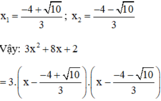Bài 2: phân tích thành nhân tử
a) (x-2)3+2-x
c) ax2-2bxy+2bx2-axy
d) x2-4xy+4y2-9a2
Hãy nhập câu hỏi của bạn vào đây, nếu là tài khoản VIP, bạn sẽ được ưu tiên trả lời.


1, \(a^6+b^3=\left(a^2+b\right)\left(a^4-a^2b+b^2\right)\)
2, \(x^2-10x+25=\left(x-5\right)^2\)
3, \(8x^3-\dfrac{1}{8}=\left(2x-\dfrac{1}{2}\right)\left(4x^2+x+\dfrac{1}{4}\right)\)
4, \(x^2+4xy+4y^2=\left(x+2y\right)^2\)
1) \(a^6+b^3=\left(a^2\right)^3+b^3=\left(a^2+b\right)\left(a^4-a^2b+b^2\right)\)
2) \(x^2-10x+25=\left(x-5\right)^2\)
3) \(8x^3-\dfrac{1}{8}=\left(2x\right)^3-\left(\dfrac{1}{3}\right)^3=\left(2x-\dfrac{1}{3}\right)\left(4x^2+\dfrac{2x}{3}+\dfrac{1}{4}\right)\)
4) \(x^2+4xy+4y^2=\left(x+2y\right)^2\)

Câu 1:
$x^2+4y^2+4xy-16=[x^2+(2y)^2+2.x.2y]-16$
$=(x+2y)^2-4^2=(x+2y-4)(x+2y+4)$
Câu 2:
$x^3+x^2+y^3+xy=(x^3+y^3)+(x^2+xy)$
$=(x+y)(x^2-xy+y^2)+x(x+y)=(x+y)(x^2-xy+y^2+x)$
Câu 1:
\(x^2+4y^2+4xy-16\)
\(=\left(x+2y\right)^2-16\)
\(=\left(x+2y+4\right)\left(x+2y-4\right)\)
Câu 2:
\(x^3+x^2+y^3+xy\)
\(=\left(x^3+y^3\right)\left(x^2+xy\right)\)
\(=\left(x+y\right)\left(x^2-xy+y^2\right)+x\left(x+y\right)\)
\(=\left(x+y\right)\left(x^2-xy+y^2+x\right)\)

b: \(8x^2-48x+6xy-36y\)
\(=8x\left(x-6\right)+6y\left(x-6\right)\)
\(=2\left(x-6\right)\left(4x+3y\right)\)
d: \(a^2-2ab+b^2-4\)
\(=\left(a-b\right)^2-4\)
\(=\left(a-b-2\right)\left(a-b+2\right)\)

a: \(=4xy\left(1-5x^2y\right)\)
b: \(=\left(x-y\right)\left(x+y\right)+3\left(x-y\right)=\left(x-y\right)\left(x+y+3\right)\)
c: \(=x\left(x-a\right)+y\left(x-a\right)=\left(x-a\right)\left(x+y\right)\)
d: \(=\left(x+2y\right)^2-36=\left(x+2y+6\right)\left(x+2y-6\right)\)

= \(-\left(x^2+4xy+4y^2\right)\)
= \(-\left(x+2y\right)^2\)

* Chứng minh:
Phương trình a x 2 + b x + c = 0 có hai nghiệm x 1 ; x 2
⇒ Theo định lý Vi-et: 
Khi đó : a.(x – x1).(x – x2)
= a.(x2 – x1.x – x2.x + x1.x2)
= a.x2 – a.x.(x1 + x2) + a.x1.x2
= 
= a . x 2 + b x + c ( đ p c m ) .
* Áp dụng:
a) 2 x 2 – 5 x + 3 = 0
Có a = 2; b = -5; c = 3
⇒ a + b + c = 2 – 5 + 3 = 0
⇒ Phương trình có hai nghiệm 
Vậy: 
b) 3 x 2 + 8 x + 2 = 0
Có a = 3; b' = 4; c = 2
⇒ Δ ’ = 4 2 – 2 . 3 = 10 > 0
⇒ Phương trình có hai nghiệm phân biệt:


Ta thấy: \(x^2+4y^2+4xy=x^2+\left(2y\right)^2+2\cdot x\cdot2y=\left(x+2y\right)^2\)
câu trả lời hay nhất đấy
x^2 + 4xy - 16 + 4y^2
= x^2 + 4xy + 4y^2 - 4^2
= (x + 2y)^2 - 4^2
= (x + 2y - 4)(x + 2y + 4)
2x^2-5xy-3y^2
= 2^x + xy - 6xy - 3y^2
= x(2x + y) - 3y(2x + y)
= (2x + y)(x - 3y)
a) \(\left(x-2\right)^3+2-x\)
\(=\left(x-2\right)^3-\left(x-2\right)\)
\(=\left(x-2\right)\left[\left(x-2\right)^2-1\right]\)
\(=\left(x-2\right)\left(x-2-1\right)\left(x-2+1\right)\)
\(=\left(x-2\right)\left(x-3\right)\left(x-1\right)\)
b) \(ax^2-2bxy+2bx^2-axy\)
\(=\left(a+2b\right)x^2-\left(a+2b\right)xy\)
\(=\left(a+2b\right)\left(x^2-xy\right)\)
\(=x\left(a+2b\right)\left(x-y\right)\)
c) \(x^2-4xy+4y^2-9a^2\)
\(=\left(x^2-4xy+4y^2\right)-9a^2\)
\(=\left(x-2y\right)^2-\left(3a\right)^2\)
\(=\left(x-2y-3a\right)\left(x-2y+3a\right)\)